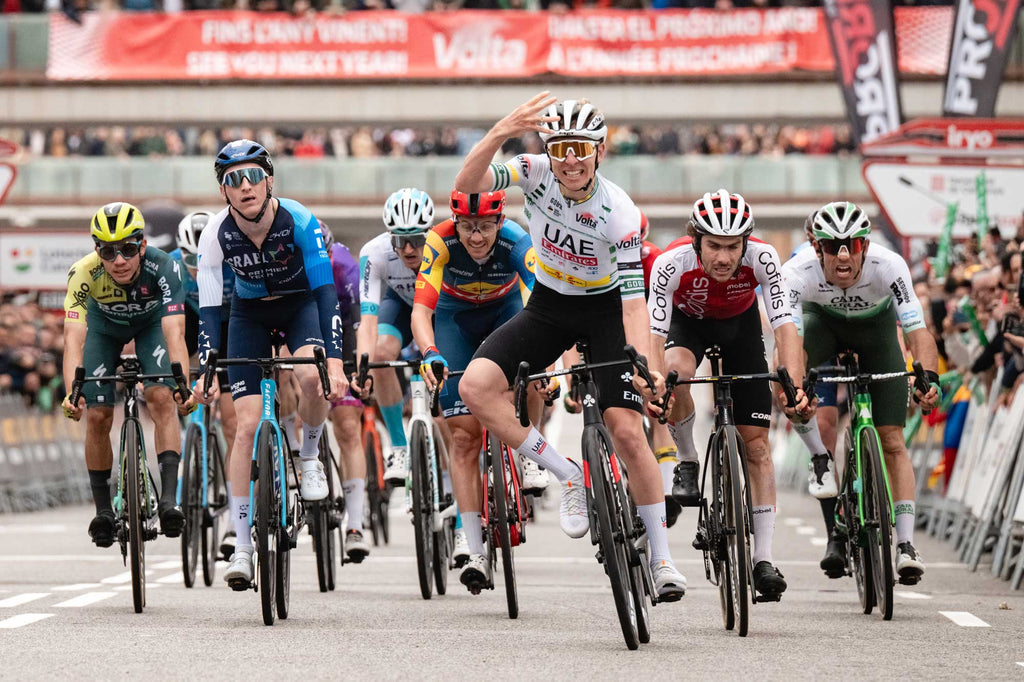Is Tadej Pogačar’s dominance the enemy of entertainment?
The Slovenian rider's performances at the recent Volta a Catalunya were historic, but did they make for good bike racing?
How did you view Tadej Pogačar’s exhibition of exhibitions at the Volta a Catalunya? Four stage wins, the biggest margin of victory in one of the toughest week-long stage races in 41 years, and a warning shot to the entire sport that not only is he better than ever, but that he now has the aim of becoming the greatest cyclist of all time.
Whether it was his three solo wins in the Pyrenees or his sprint victory in Barcelona – a triumph that elicited a deafening roar of euphoria from the roadside spectators akin to a football crowd – Pogačar was completely irrepressible, unmatchable, and, quite frankly, extraordinarily brilliant. Ahead of his attempt to win the Giro d’Italia and Tour de France in the same year, he confirmed that, “I am in the best shape I have ever been in. I would say I feel the most comfortable I ever have done on the bike.”
We are witnessing, in this author’s view at least, the 21st century Eddy Merckx. This is what it must have been like to witness The Cannibal - a bike rider turning up to races, instilling fear in his rivals before the race ribbon has even been cut, and then annihilating the opposition when and how he wants. We are lucky, so incredibly fortunate, to be graced by his talent, to have the opportunity to watch an immensely likeable artist, using the bike as his utensil, repeatedly creating modern works of art on the canvases of mountain passes and city centre streets.

With his white tips in his hair – a touch of glamour to add to his stardust – he looked a few centimetres taller last week, and spoke the grandest of words: “Now I have arrived at this point where I really strive to be the best ever,” he said. When a young fan shouted through the podium fencing after stage five, “Pogačar, win the Tour”, he smiled, as he always does, and replied: “Yes, of course.” It drew a rousing cheer. We are in the midst of a sporting icon, a legendary figure, and he pedalled, danced and walked around northern Spain with an aura of invincibility. This is his sport, just like it was Merckx’s, and he has near-complete control over it.
Was – is – his dominance, however, also the enemy of entertainment? A masterclass is breathtaking and enjoyable every once in a while, but repeated demonstrations of superiority are not. Pogačar winning has become such a foregone conclusion, that unless you’re at the roadside watching the superstar ride past you, it’s no longer fun. You can admire, marvel and laud his talent, but the spectacle has been stripped of its intrigue and suspense, and replaced by predictability and the formulaic. Indeed, riders present at the Volta admitted that whenever the UAE Team Emirates man is racing, the real race is for second and the minor places. They no longer harbour even the smallest ambitions of winning.
Cycling is a sport that has long since courted, and been obsessed by, Formula One: its cutting edge technology, the way it transformed itself from a niche sport to a worldwide entertainment monolith, and in recent years its Netflix successes. Cycling has and continues to copy its four-wheel rival.
In a way it never really desired, cycling has now drawn parity with F1. Not financially, and certainly not with the number of eyes on it, but in terms of performances, because now the same set of athletes – Pogačar, his only true adversary Jonas Vingegaard, Mathieu van der Poel, Lotte Kopecky, Demi Vollering and Remco Evenepoel – are winning almost all of the big races. When Max Verstappen doesn’t win an F1 race – like this past weekend – it’s presented as breaking news, as a shocking development. For cycling’s parallel, just look at Gent-Wevelgem: Mads Pedersen’s victory over Van der Poel was projected as the latter losing, rather than the former winning.
There is no doubt that we are living in a golden era of cycling: the Pogačar-Vingegaard rivalry is already a mythical duel; one-day races are exploding 100km from the finish; and there are a handful of figures who already populate most observers’ greatest ever lists.

But contrary to popular belief, I’d argue that these are not the best days for cycle racing. Just like in every other sport, there has and always will be periods of dominators, eras defined by one athlete, and sport’s cyclical nature means that current stars will fade and new ones will emerge. But right now, Pogačar and his aforementioned colleagues are far too good for the rest of the peloton, and competition is being stymied and neutralised.
When bike riders start admitting that they can’t even compete with the best, what’s the point in even watching the racing? We’re being treated to a Formula One-like parade of one man’s excellence, a procession of class that is losing its splendour.
People, including riders, point out that “at least there’s two of them”, in reference to Vingegaard, and say that this year’s Tour, also with Evenepoel and Primož Roglič, will be the scene of another memorable battle. True, absolutely true - it’s a salivating four-way match-up. But is being excited by only one stage race a year really what we want from our sport? I want to be entertained by every race, not just by the Tour. Pogačar’s performances in Catalunya, ditto Vingegaard’s at Tirreno-Adriatico, were monumental; they were historic - true greats at their finest. But this complete domination really is the enemy of entertainment. Cycling has got what it craved: it’s finally Formula One-lite.






























